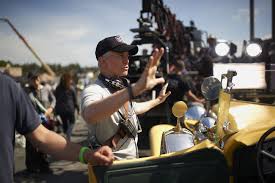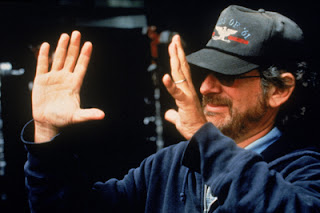Roles in TV & Film Industry
Most information here comes from a mix of my own knowledge as well as from creativeskillset.org. Where I've used info not from these two sources I will state and link to where I got the information. Money figures used in this post are on a per year bases.
Director

What is a Director?
The Director is the creative driving force behind a films production. Its the directors job to visualise the script from paper onto the screen and to do this they need a hand in each and every area of the film from script edits to casting to the design teams to production to editing to distribution. Directors can also be involved with a script from its conception either having co-written or commissioned it themselves. The Director has to act as the common link between all the departments of the film to make sure everyone is headed in the right direction and working together to get the perfect final product.
How can I become a Director?
To be a director you need to be a confident leader, creative, committed, inspirational and eye for detail. This is due to there being a lot of different departments will rely on you and your creative vision for the production. you also need to be able to keep people motivated and if needed be able to delagate between parties when disputes arise.
There's no official formal qualification needed to be a Director however it helps to have experience, and there are plenty of Film production courses at Universities that offer Direction as a specialisation. That being said with internet video sites such as YouTube, Vimeo etc... it is easier than ever to become a filmmaker and Direct your own productions.
Thomas "Tomska" Ridgewell is an example of a non feature/non main industry director. He is a YouTube Creator and has been since 2006. He has his own company TurboPunch Ldt. and his role within his productions are co-writer, actor, and director. He is known for creating animated and Live action comedy shorts often featuring dark humour.
What about Money?
Directors are paid on a contractual or per project basis and the rates tend to vary depending on type of production and the directors experience. According to PayScale in the U.S. the average director's salary is just under $60,000 (roughly £48,000) per year.*
*http://www.payscale.com/research/US/Job=Film_Director/Salary


Producer

What is a Producer?
The Producer is the only person on set with more power than the Director. The Producer often acts as the link between the Production Studio and the Director. Its usually his job to find a screenplay to make the production, to finance the film, distribute the film, and look after the budget by having last say on locations, shooting scripts, production schedule etc...
To be a Producer you need to have experience in film, be good with business, have excellent communication skills and be good at negotiating.
How can I become a Producer?
Once again there is no specific qualification needed to become a Producer but experience is always a benefit to have and will show you know what your doing.
What about Money?
Once again the money a producer earns will be based on the production type and their experience and will most likely be on a contractual/per production bases. According to PayScale the average U.S. Produce earns about $67,000 (roughly £53,000)*
*http://www.payscale.com/research/US/Job=Film%2fTV_Producer/Salary
Editor

What is an Editor?
The Editors job is to work closely with the Director to piece together the footage into a coherent film. An Editor will often work with the Director from the start making sure the maximum potential of the screenplay will be able to be realised during post production of the film. They must be able to keep in mind the coherence of the film as they more often than not will get footage sequences out of order to edit. To be an editor you need to have a technical aptitude, experience, understand rhythm, pace and tension. as well as have a great eye for detail and a lot of patience
How can I become a Editor?
Like other Media positions there are no formal qualifications you need to become an editor, however experience is key, and most people will spend a few years as a trainee followed by a 2nd assistant (on big budget films), first assistant then Editor however it can take a long time to move away from being the assistant editor as to be an editor you need to be able to lead the assistant editors as well.
What about Money?
The average pay for an editor in the UK is roughly £24,000*. but once again this is subject to experience and also on whether its a contractual/per production basis.
*http://www.payscale.com/research/UK/Job=Film_Editor/Salary
Director of Photography (Cinematographer)

What is a DoP?
The Director of Photography is overall responsible for the Camera crew and making sure the visual style of the film is realised. To do this they work closely with the Gaffer, who is in charge of lighting, the production and costume designers and the hair & make up departments. To be a DoP you need a good knowledge/understanding of the filming processes, considerable industry experience, be quick at decision making, as well as being creative, great at communication and a great eye for detail.
How can I become a DoP?
To become a DoP you will usually work your way up the camera team from 2nd assistant camera operator to camera operator before possibly becoming Second Unit DoP, before finally becoming DoP.
What about Money?
A Director of Photography in the US will earn roughly $72,000 per year, this once again will be based on experience and type of production.
*http://www.payscale.com/research/US/Job=Photography_Director/Salary
Sound Recordist (Sound Engineer)

What is a Sound Engineer?
A sound engineer record sound this can be on location or in a studio and do their best to ensure the highest quality sound is recorded at the time of filming. Sound Engineers are responsible for producing the final sound mix, so they directly supervise the Sound Assistants and Boom Operators as well as occasionally managing the rest of the sound crew. To be a sound engineer you need to be a strong team player, willing and able to compromise, have excellent hearing, balance, agility and a good sense of timing and have good communication skills.
How can I become a Sound Engineer?
You don't need a qualification to be a TV Sound Engineer. However you do nee to able to show a strong interest in sound and the understanding of its properties. There are plenty of Sound oriented degrees available to gain the in depth knowledge of sound. Though working your way up from trainee to assistant etc.. is still another option.
What about Money?
A Sound Engineer in the US can expect to earn on average about $43,000*, depending on experience and type of production.
*http://www.payscale.com/research/US/Job=Sound_Engineer/
Production Designer


What is a Production Designer?
Production Designers are in charge of the entire art department on film crews. They must carefully calculate how much of their budget will be spent. They will also consider whether there are design elements that may give more depth to the film and whether CGI is needed. Production designers create design sketches that the art directors will then use to create technical drawings and models of before the construction teams can then bu,ild the sets. To be a Production Designer you need excellent visual awareness and design skills, expert knowledge of many art and design subjects including draughtsmanship, technical drawing, colour theory, architecture, building and construction, interior design, lighting etc..., show excellent management and leadership skills and have good communication and presentation skills.
How can I become a Production Designer?
As the head of the largest department on a film crew, you must have extensive experience gained over a number of years and preferably be a graduate of art related courses such as art, architecture, theatre, 3D design etc...
What about Money?
The average salary for a production designer is about $130,000* however this will depend on experience and type of productions.
* according to http://work.chron.com/salary-movie-production-designer-5812.html
Researcher

What is a Researcher?
It is the Specialist Researcher's bob to make sure every detail on set is as authentic and believable as possible. To do this they work closely with the Production Designer. Specialist Researchers can spend a large majority of time talking with curators, academics and other experts to learn as much about a particular subject as possible. To succeed as a Specialist researcher you need to have good general knowledge, have a good understanding of research resources, be highly organised and have good communication skills.
How can I become a Researcher?
To become a specialist researcher it is recommended but not necessary to have an arts degree but it is preferred you have previous experience in the art department on films.
What about Money?
A researcher is expected to earn an average of £35,000*, depending on experience and production type.
*https://nationalcareersservice.direct.gov.uk/job-profiles/media-researcher#salary
Location Manager

What is a Location Manager?
The Location Managers' primary role is to identify and find ideal locations for a film shoot which can ake months of research and scouting. When finding a location they need to take into account accessibility, the shooting schedule and budget and also negotiate terms of the crew/vehicle access, parking, power sources, catering requirements as well as any official permissions that may be needed. During production they keep crew and cast informed with the aspects of the locations such as where it is and how to get there. To be a successful Location manager you need to be committed as usually the first to arrive and last to leave it is your job to make sure the location is left in a satisfactory state after filming. You also need to be reliable and enthusiastic, have good negotiating skills, excellent organisational skills and have plenty of initiative. It is also a good idea to have a full driving license and a vehicle.
How can I become a Location Manager?
You don’t need a formal qualification to become a Location Manager though health and safety training is a useful thing to have. You can get into being a Location manager by moving up that department from Location scout to Location assistant to Location Manager.
What about Money?
Location managers can expect to earn somewhere between £22,000-£36,000* depending on experience and type of production
*https://www.allaboutcareers.com/careers/job-profile/location-manager
Camera Operator


What is a Camera Operator?
Camera Operators carry out the Director of Photography’s (DoP) and Director’s instructions for shots. Camera Operators can liaise with the Grip and other Heads of Department, to keep them informed about how the position/movement of the camera might impact their dept. During shooting Operators will be responsible for the aspects of camera operation, this allows the DoP to concentrate on lighting and overall visual style. Operators have to make sure the camera and equipment are prepared for the required set-up. To be a Camera Operator you need to know how to operate the camera expertly, provide creative input, have a good sense of visual composition, perspective and movement and be able to collaborate and work as part of a team as well as have precise attention to detail.
How can I become a Camera Operator?
There are no specific qualifications needed to become a camera operator though film schools can offer good basic training in camera useful. Photography skills are also a good bonus. You can get to this position through being an on set camera trainee. The role of camera operator can lead to being a DoP.
What about Money?
On average in the UK camera operators can expect to earn roughly £30,000*
*http://www.payscale.com/research/UK/Job=Cameraman/Salary
Runners

What is a Runner?
There are several different types of runners in film, from production to Floor runners
A floor runner is the entry-level position within the film industry. though many Directors, Producers and Technicians have begun their careers as runners. Floor Runners will usually be instructed by the Assistant Director and are generally there to run errands including conveying messages, organising props, looking after cast and crew (e.g. making tea and coffee), driving, delivering technical equipment, and following specific requests from the Producer, Director or Assistant Directors. To be a good floor runner you need to be reliable as small delays by you can become big delays for the production. You also need to have a 'can do' attitude, complete tasks efficiently and quickly, be observant, reliable and organised.
A production runner will mainly be used by the Producer, and can often have off-set responsibilities in the production office such taking calls, filing paperwork and data entry as well as this they may arrange lunches, dinners, make transportation reservations, do photocopying and general office administration, they may also distribute production paperwork such as call sheets, health and safety notices etc... To be a successful production runner you need good organisational and administrative skills, be able to work without supervision, be tactful and diplomatic and have good communication skills.
How can I become a Runner?
As a runner is an entry level position on a film no qualifications are required. However it can more often than not be required for you to have a full driving licence and a vehicle.
Getting experience as a runner can be beneficial for anyone who wants to work in any part of film making, this is because as a runner you can build a reliable reputation and through that connections which can help you move into the area you want to be working in
What about Money?
As the most ebntry level position on a film set a runner wont get paid an annual salary but a hourly one instead. In the UK this can range from around £7.50-£13.38 per hour*.
*https://www.prospects.ac.uk/job-profiles/runner-broadcasting-film-video#salary
No comments:
Post a Comment